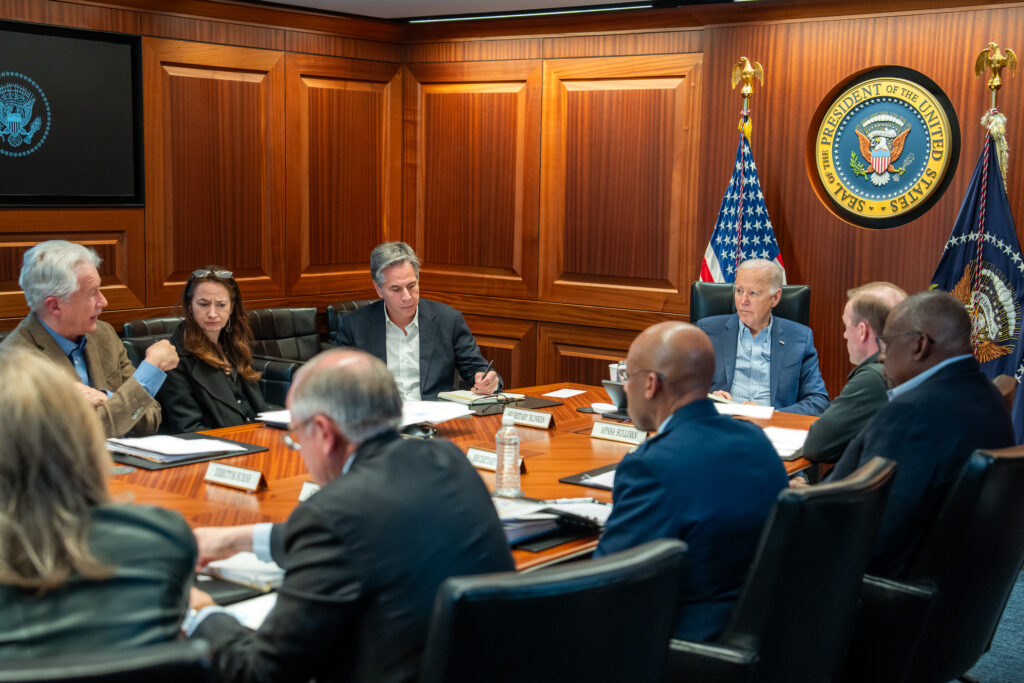Australia/Israel Review
Why Israel shouldn’t “Take the win”
Apr 22, 2024 | Walter Russell Mead

“Take the win”, President Biden reportedly advised Prime Minister Binyamin Netanyahu after Iran’s unprecedented missile and drone attacks against Israel on April 14 sputtered shambolically to an ignominious end.
As the world waits on tenterhooks for Israel’s response, two things seemed clear. It would be political suicide for Mr Netanyahu to take the President’s advice, and it would be national suicide for any Israeli prime minister to do so. Mr Biden is primarily worried about his re-election, a cause he conveniently if sincerely conflates with the survival of democracy in the US and of freedom in the world. Israel is worried about something more tangible – the survival of the world’s only Jewish state.
Mr Biden is a lot smarter about the Middle East today than he was in January 2021, when he was still spouting inanities about isolating Saudi Arabia and pursuing the will o’ the wisp of détente with Iran. Today the President understands that he can’t simply shake hands with Iran and walk away from the Middle East. If the US hopes to step back from a front-line role in the region, it must foster an alliance that can check Iran’s unrelenting and fanatical drive for hegemony. That is why Team Biden dramatically reversed its early policy of making Saudi Arabia a “pariah” and, borrowing some of the core concepts of Donald Trump’s Abraham Accords, made the promotion of an Israel-Saudi alliance a cornerstone of its regional strategy.
This was an intelligent move, as far as it went. Until and unless Iran’s insatiable ambitions can be curbed, nothing but tumult and terrorism awaits the weary people of a region whose fossil fuel riches remain critical to the smooth functioning of the world economy. From an American point of view, assembling a group of American allies to take our place on the front lines at a time when we need to focus more closely on the Indo-Pacific is common sense.
What the President appears not yet to understand is that Iran has become so powerful, and America’s reputation as a source of sound policy and reliable support so weak, that only resolute American backing of our allies can turn the tide.
This problem has been decades in the making. George W. Bush’s mismanagement in Iraq removed the one regional power capable of containing Iran on its own – without building an effective replacement. Barack Obama’s feckless Syria policy gave Iran and its new best friend, Russia, a commanding position in the heart of the Middle East. Mr Trump’s support for the Abraham Accords and tough policies toward Iran pointed in the right direction, but were mostly a case of too little, too late, and too erratic. Mr Biden’s support for Israel is appreciated in Arab capitals as well as in Jerusalem, but his vacillations with Iran have further strengthened the ayatollahs and undercut America’s much-diminished prestige.

President Joe Biden meets with members of the National Security team regarding the unfolding missile attacks on Israel from Iran, Saturday, April 13, 2024, in the White House Situation Room (Official White House photo by Adam Schultz)
National Security Adviser Jake Sullivan’s poorly timed Foreign Affairs article last October, hailing what he thought was the greatest regional stability in decades, was the cherry on the sundae of perceived intellectual incompetence by American policymakers in the region.
From an Arab point of view, there are two things that make Israel valuable at a time of diminished confidence in the US. First, Israel sees the common fight against Iran as part of its own fight for survival. It will be a reliable ally because it has no choice. Second, Israel offers the mix of strength and relentlessness without which Iran cannot be stopped. At a time when liberal opinion in the US was elegantly wringing its hands about Israeli ruthlessness in Gaza destroying any possibility of Arab-Israeli cooperation, Jordan and Saudi Arabia leapt to Israel’s defence against the Iranian attacks. The fastest way for Israel to lose friends in the Middle East would be to start thinking like American liberal foreign policy hands.
This isn’t an ideal situation by any standard, and one may hope that better times will bring nobler views, but people fighting for their survival against an utterly amoral opponent will do what they must. Americans eager to critique what they see as the immorality of the region’s governments should reflect on the part our own poor choices have played in the deterioration of Middle Eastern security to its current abysmal state.
Meanwhile, Mr Biden will continue trying to save the world by getting re-elected and will evaluate developments abroad by their projected effect on Wisconsin and Michigan. Mr Netanyahu will have to steer a course between the disastrous alternatives of alienating Mr Biden by ignoring his preferences or endangering Israel by taking his advice.
Walter Russell Mead is the Ravenel B. Curry III Distinguished Fellow in Strategy and Statesmanship at Hudson Institute, the “Global View” columnist at the Wall Street Journal and the James Clarke Chace Professor of Foreign Affairs and Humanities at Bard College in New York. © Wall Street Journal (wsj.com), reprinted by permission, all rights reserved.
Tags: Iran, Israel, Middle East, United States






